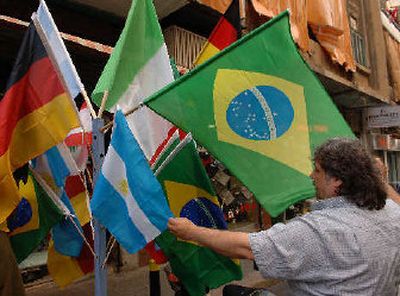A modest goal

BEIRUT, Lebanon — The flags are up and the fans are frenzied. That doesn’t mean everyone in the Middle East will be able to flip on the TV and see the World Cup.
Soccer fever here is getting a dose of market reality: A billionaire satellite-TV impresario who scooped up exclusive broadcasting rights across the region is charging fees steep enough that many won’t be able to watch.
On the eve of the tournament, governments are scrambling as if it’s an issue of national security.
In Egypt, the head of the state satellite Nile Sport Channel urged United Nations intervention to protect what he called a “human right.”
Jordan’s king distributed free receivers to the military and ordered that public screens be set up so low-income citizens can watch. Saudi Arabia’s ruler ordered that his nation’s games be broadcast on national TV and Algeria’s president sent his communications minister to negotiate the airing of matches.
In impoverished Yemen, pirates will try to save the day. Entrepreneurs with subscriptions are selling illegal cable hookups to their neighbors for about $5 a pop — far less than the cost of the satellite package.
The scramble began when viewers across the Arab world realized they wouldn’t be able to watch the World Cup on free national TV. The rights belong to Arab Radio and Television (ART), a satellite pay-TV network owned by Saudi businessman Sheik Saleh Kamel.
Subscription costs differ by country but are generally beyond the means of the average Arab citizen. In Lebanon an annual subscription runs $180; the cost reaches $398 in Jordan.
Soccer has long been a favorite sport among Arabs, so it comes as no surprise that governments took action. And keeping people, especially troublemakers, off the streets might help explain why governments were so eager to intervene.
The game offers relief in a region deluged with daily doses of bad news — carnage in Iraq, Iran’s nuclear tensions with the West, raids in the Palestinian territories. During Lebanon’s 1975-90 civil war, shooting would stop when games were played. In Egypt, Algeria and Morocco, soccer is nearly a religion.
Which is why not being able to see the World Cup amounts to a crisis. So far, most of the news has been bad.
Morocco’s communications minister confessed in parliament last week that the two national public TV stations can’t afford the $13 million broadcast fee that ART is demanding. Barring an last-minute agreement, Moroccans will see a 20-minute summary of individual World Cup games.
In Egypt, talks between state-run television and ART are stalemated.
“I will just have to subscribe to ART,” moaned Shadi Azer, an Egyptian engineer. “Forget about going to the beach, buying summer clothes, or any other entertainment this year.”
To offset the frustrations, Egypt’s ruling National Democratic party, members of parliament and sports officials promised to set up huge screens in public squares in most provinces.
One alternative is squeezing into crowded coffee shops that have ART subscriptions and show the games on wide-screen TVs. And then there’s the illegal yet common practice of buying decoders for $3.50 a month.
There was finally some good news Tuesday in Lebanon, where national flags of teams in the tournament — Jordan is not among them — flutter from almost every building and car window.